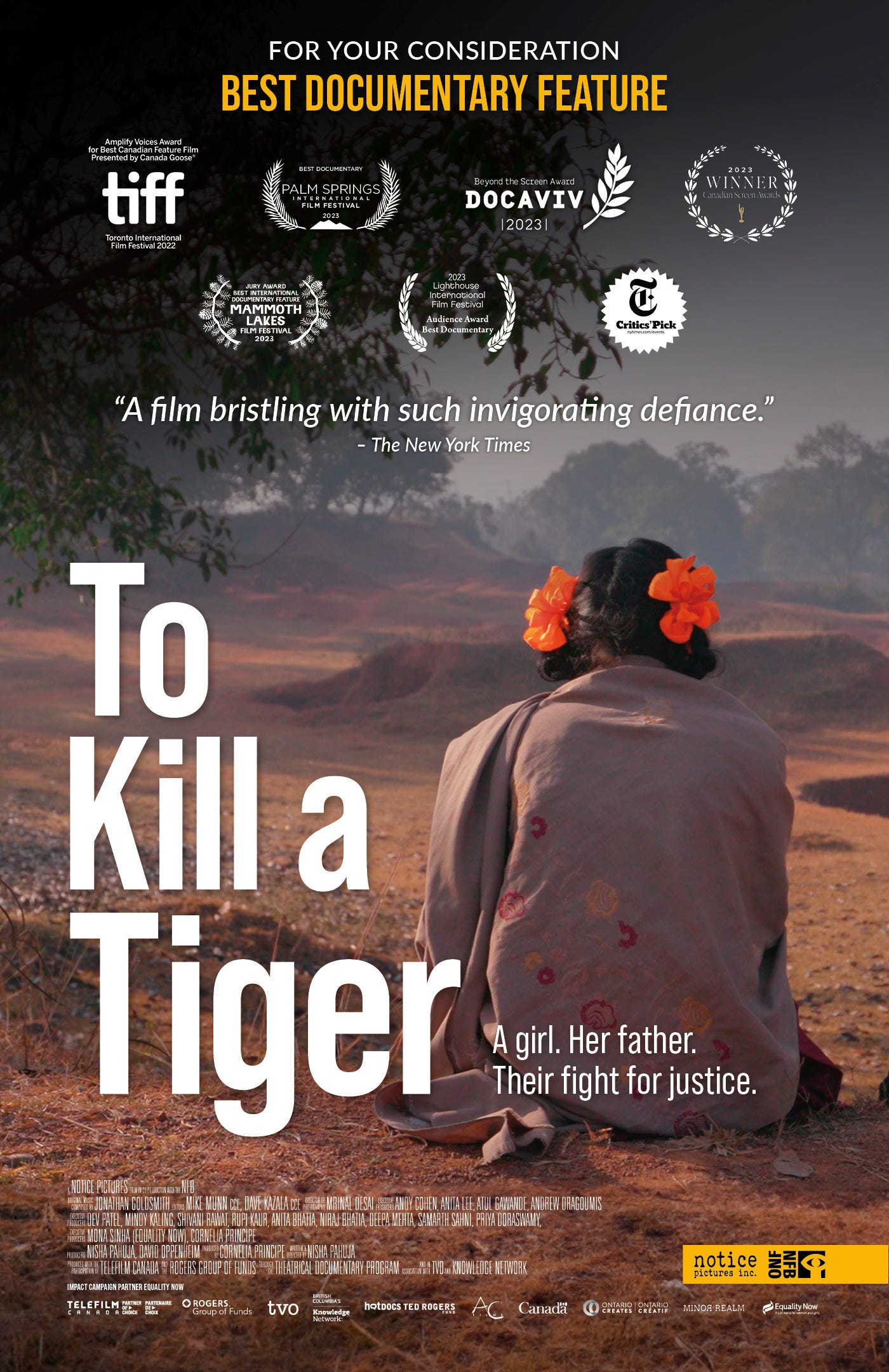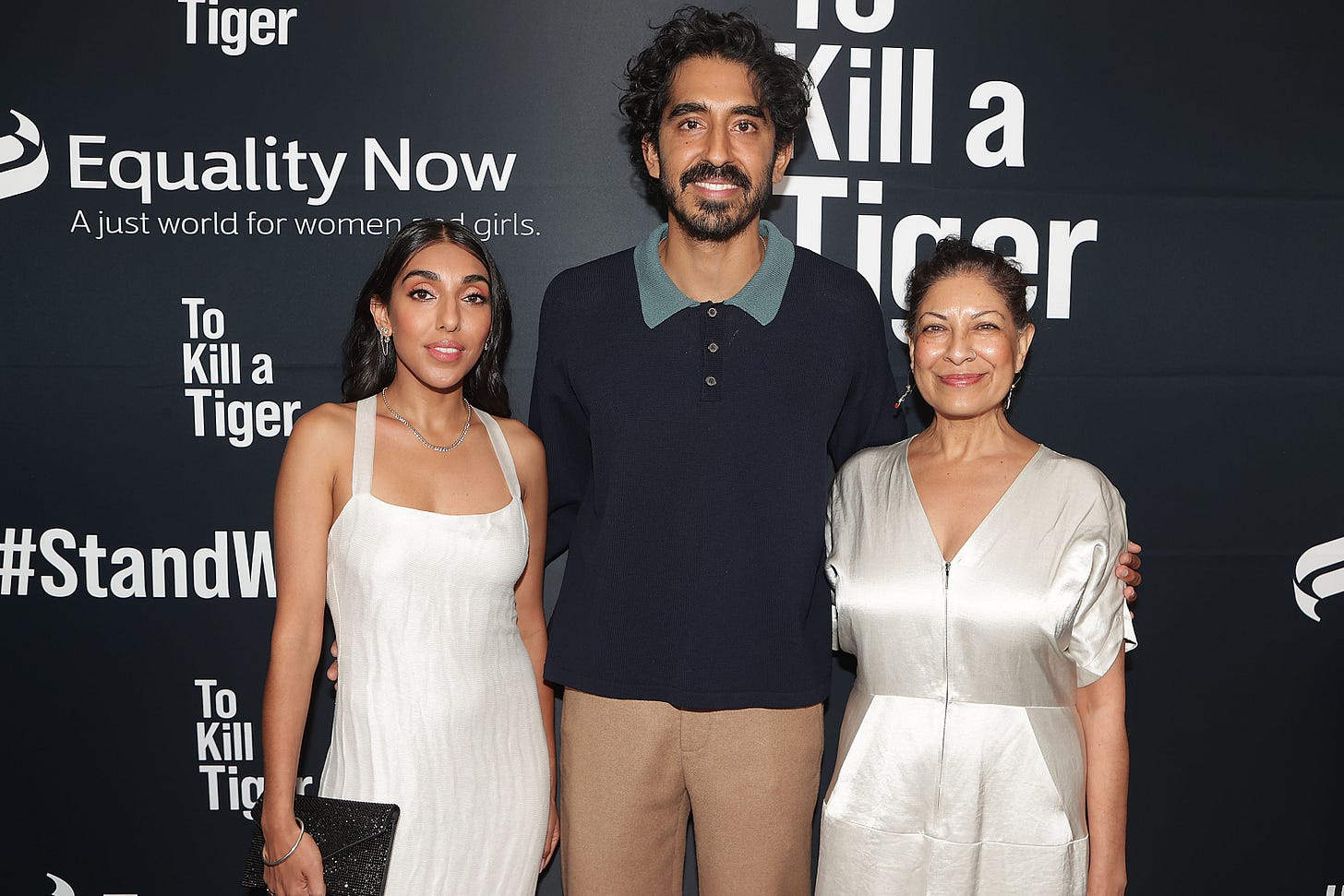Nisha Pahuja (Filmmaker, To Kill a Tiger) | Renegades
The documentarian on truth, injustice, and the filmmaking process
Welcome to Renegades, a series spotlighting Asian Pacific leaders and creatives who are carving their own paths and defying stereotypes along the way.
This week, we caught up with director, writer, producer, and documentarian Nisha Pahuja. Her latest film, To Kill a Tiger, is now playing in limited theaters. Visit tokillatigerfilm.com to find your nearest screening.
Tell us about your personal background and life experiences that led you to create a documentary like To Kill a Tiger.
I grew up in Toronto, Canada, the child of immigrants in the 1970s. It was the typical experience of not quite knowing who you were and who you were supposed to be. One thing that was clear, is that the culture I was raised in at home was very different than the one I witnessed outside. I began to question the double standards and the controls that were put on me and my mother, as well as the unfair expectations imposed on my brothers for being boys. The whole system felt wrong, and I rebelled against it very vocally.
I think that experience with injustice—especially witnessing the control my father felt entitled to exert because he was a man—began a life-long process of asking the question “Why?” I became intrigued by the relationship between the various systems that govern our lives and the geography and impulses of the human heart. My belief is that all the systems that control us are simply a manifestation of who we are as people. Until we understand this connection between our interior worlds and the world outside, there will always be oppression and injustice. If we are honest with ourselves, we’d see that the ability and even the willingness to oppress exists to degrees in all of us. I think that's why To Kill a Tiger, like much of my film work, is non-judgmental and invites audiences in. I try as much as possible to be agenda-free.
To Kill a Tiger sheds light on India's prevailing rape culture, where sexual violence often goes unreported and prosecutions are rare. How does the documentary aim to challenge this status quo and contribute to a broader conversation about sexual violence and justice, both in India and globally?
We took eight years to carefully craft and tell this story because we believed in the inherent power of this film to have an impact on a global conversation around gender justice. For me, the power of this story is two-fold. First, I believe that the quiet, resolute courage the family show, especially the young survivor “Kiran,” who never once wavered in her steadfast determination for justice, will encourage other survivors to come forward. In fact, she already has, as so many have reached out to me to share what she's meant to them.
Secondly, Ranjit, as a man who defies his community for his daughter—even at the potential risk of death— is a powerful example of what we need men the world over to do: become champions for gender equality. The reason Ranjit is so effective is because he fights in a way that is quiet, without bravado and ego. He does it out of love and, just as importantly, an understanding of the importance of human rights. For far too long, women have carried the burden of fighting for their rights—when in fact, the issue is not us—the issue is patriarchy. And this is a system that needs men, who are at the top of the pyramid, to admit the unfair privilege it's afforded them, and now, to fight for its dismantling.
It's also very important to remember that although this story takes place in India, the issues that “Kiran” faced—with the courts, the judiciary, the police and even the shaming she was subjected to, these attitudes and barriers to justice are universal. We are going to work with the organization Equality Now to have an impact on these prejudices, both in the legal systems of countries around the world as well as creating a global dialogue on masculinity. More information on our Impact Campaign goals can be found here.
Throughout the film, NGOs like the Srijan Foundation play a significant role in advocating for gender rights and supporting survivors. Can you elaborate on the impact of such organizations and their collaboration with the family in the pursuit of justice?
Without doubt, the activists in the film both from the Srijan Foundation, as well as The Centre for Health and Social Justice, play a pivotal role. I feel that Ranjit would have continued to fight regardless, but having them on our side was an immense support and part of the reason (as well as having a film crew follow him around) that he was taken seriously at court. He would have had a much harder road had he been on his own. In India, the importance of these organizations can't be underestimated. Given how huge the country is and how complex, this kind of boots-on-the-ground activism and engagement is a key part of how change happens in India. Mahendra Kumar, one of the activists we feature is one of my great heroes. He was recently recognized for his work on the field of masculinity. My next film is about him and his work, and I can't wait for people to get to know him and the journey that life has taken him on.
How has “Kiran’s” involvement in the filmmaking process impacted the storytelling and the documentary's overall message?
Initially “Kiran” was going to be a much smaller presence in the film because in my mind I was making a very different film. It was only after two years of editing that we realized she needed to be a bigger part of the story. I am so glad we pivoted to this new approach where we focused exclusively on the family and not the other storylines that we had tried to weave in. Dev Patel puts it the most beautifully when he describes her. He calls her "the film's North Star." And he's right. She really is the moral heart of this film. I will never forget the moment when she said to me on camera,
"Aren't we put on this earth to do good? Isn't that why God sent us here in the first place?”
At the time, she was only 14. It’s that level of profundity which has me convinced that this story chose us and she chose us—and for that, all of us must thank her and this family and even the community they come from. From this deeply regrettable situation, we have so much to learn, including that change is possible and must be fought for.
The filmmaking process included capturing authentic moments of tension, such as a confrontation with villagers. Can you share more about the challenges and emotions your team faced during these intense moments and how they influenced the storytelling in the documentary?
Yeah—this was a hard film to make on so many levels. For starters, you're telling the story of a 13 year old survivor. My God, to fathom the deep tragedy of that and then to add a camera to that mix …
Those ethical dilemmas that we constantly were dealing with and still deal with are a large part of this film. And then there was witnessing what Ranjit and his wife had to face—the daily humiliations of court, the poverty, the swallowing of their pride constantly in order to seek justice—it was very difficult to watch that. We talked about these things constantly as a crew but we never shied away from filming in the moment. We filmed in a way that was very quiet, respectful and sensitive, and we also knew that we were there to bear witness and that what we were capturing had the potential to galvanize, and to create that kind of empathy where social transformation is possible.
In terms of the moment when the villagers threaten the crew—yes, no doubt that was a very tense situation which could have gone terribly wrong. But more than fear in that situation, I felt remorse for being part of a rupture—a necessary rupture—but a rupture nonetheless.
As executive producers, Mindy Kaling and Dev Patel contributed to "To Kill a Tiger." How did their involvement impact the film's creation and message?
We have a number of amazing EPs on this film—Dev Patel, Mindy Kaling, Rupi Kaur, Atul Gawande, Anita Lee, Andy Cohen, Drew Dragoumis, Shivani Rawat, Mona Sinha—the list goes on. Mindy, Dev and Rupi came on after the film was done to help us amplify the message of the film and to ensure its visibility and audience. Their support has been invaluable in getting people to take note. We know the power of the film and the beauty of it and the hope that it engenders. Our EPs have helped get the necessary eyes on it and then the magic of the family takes over.
To Kill a Tiger addresses thought-provoking questions about seeking justice through the legal system and the toll it takes on survivors and their families. Can you discuss the impact of “Kiran's” family's journey on the broader societal and cultural context in India?
When I first met Mahendra Kumar, the activist, in the film, I asked him about change and whether he thought change was possible given the headlines that continually come out of India. He smiled and said:
"It takes many drops to make an ocean ..."
For me, Ranjit and “Kiran” and this story is one, great, big drop in this vast ocean—and it's a drop that has the potential to create large ripples—hence the importance of our Impact Campaign. In the immediate sense, in their region, more women and girls gained the courage to come forward and men and boys were definitely impacted. But I believe their story can achieve a great deal in India, and we're planning on doing that with Dev and Equality Now and other partners who are poised to join us.






